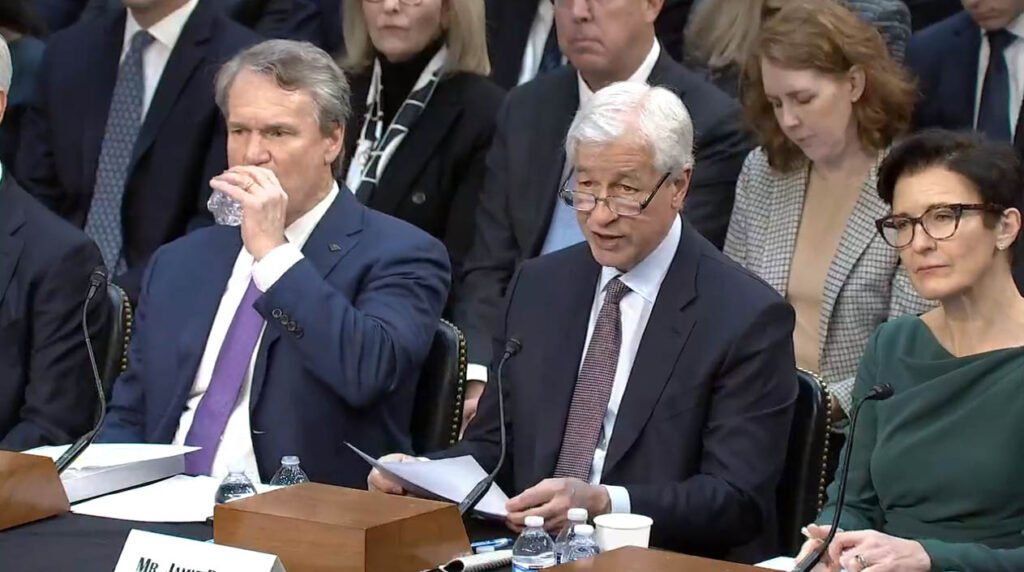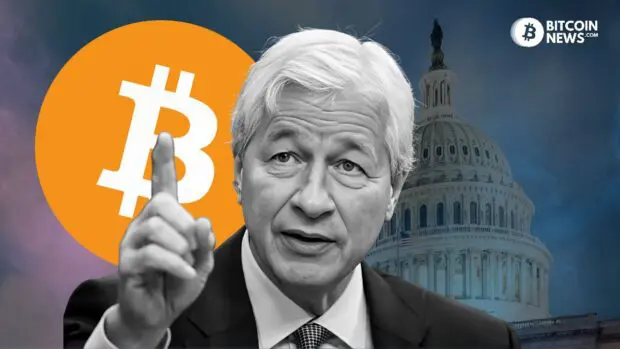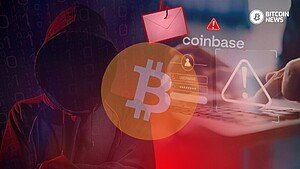Jamie Dimon Bitcoin sentiments stays unchanged, as he stands firm against Bitcoin and digital assets. His repeated criticism of digital assets, as the CEO of JPMorgan Chase, sparks debates, highlighting the tension between his views and the bank’s involvement in blockchain innovation.
Being a vocal critic, he reiterated his opposition to Bitcoin and digital assets during a Senate Banking Committee hearing on Wednesday. This latest Jamie Dimon Bitcoin sentiment has been making rounds in social media, as he suggests that if given the power, he would “close down” the entire digital asset industry.

He stated:
“If I was the government, I’d close it down […] I’ve always been opposed to crypto, Bitcoin, etcetera.”
His recent statement shows he doesn’t differentiate between Bitcoin and the altcoins, and sees them through the same lens.
His historical disdain for Bitcoin and digital assets dates back to 2017, where he labeled Bitcoin as a “fraud” and “worse than tulip bulbs.” He also expressed doubt about whether Bitcoin’s supply would indeed be limited to 21 million coins, stating:
“Maybe it’s gonna get to 21 million and Satoshi’s picture is gonna come up and laugh at you all.”
Senate Hearing and Opposition
During the hearing, Senator Elizabeth Warren found common ground with banking leaders, citing concerns about digital assets’ potential exploitation by terrorists to bypass financial regulations. She raised alarms, pointing out possible nefarious uses by bad actors, intensifying the scrutiny on digital assets.
She stated:
“Today’s terrorists have a new way to get around the Bank Secrecy Act: cryptocurrency […] Last year an estimated $20 billion in illicit crypto transactions funded every kind of dangerous criminal. North Korea has funded at least half its missile program, including nuclear weapons, using the proceeds of crypto crime.”
Repetition of a False Narrative
Interestingly enough, the same narrative could be heard from major U.S. publications in October.
An October 10 article by the Wall Street Journal claimed that Hamas and similar groups raised significant funds through blockchain-based transactions. The report suggested that the Palestinian Islamic Jihad (PIJ) received about $93 million in digital assets from supporters between August 2021 and June 2023.
The WSJ, citing blockchain analysis from Elliptic, also asserted that Hamas was using digital assets to support its activities. This led to increased concerns about digital assets in the U.S., with Senator Elizabeth Warren and others urging action against illicit digital-asset activities.
However, Elliptic later published a report stating that the WSJ and lawmakers manipulated data to make digital assets appear negative, refuting the claim that Hamas received significant crypto donations.
In response to Elliptic’s clarification, the WSJ partially corrected its article, acknowledging that Palestinian Islamic Jihad and Hezbollah might have exchanged up to $12 million in crypto since 2021, correcting an earlier misstatement that PIJ had sent more than $12 million in digital assets to Hezbollah.
Jamie Dimon Bitcoin Sentiments: Industry’s Response and Debate
Dimon’s view echoes concerns that digital assets primarily serve criminal activities like money laundering and tax avoidance due to its relative anonymity. Dimon insisted on his views, and when asked by senator Warren “why terrorists are so drawn to digital assets”, he replied:
“The true use case for it is criminals, drug traffickers, money laundering, tax avoidance, and that is a use case because it is somewhat anonymous, not fully, and because you can move money instantaneously.”
However, proponents counterargue, emphasizing the transparency of Bitcoin’s ledger and its potential benefits for law enforcement.
X users within the industry, swiftly highlighted instances of regulatory fines against JP Morgan and other banks for rule breaches, stating that JPMorgan Chase was fined more than 7,400 times, totaling up to $380+ billion in fines since 2000.
JPMorgan’s “Blockchain Innovations”
What many news outlets found interesting, is that despite Dimon’s strict “anti-crypto” stance, JPMorgan is quietly advancing its own “blockchain projects”. The bank’s notable projects include the development of JPM Coin, a stablecoin leveraging Ethereum’s blockchain. This coin is believed to facilitate swift and secure transactions, gaining traction among corporate clients like FedEx and Siemens.
Related reading:










